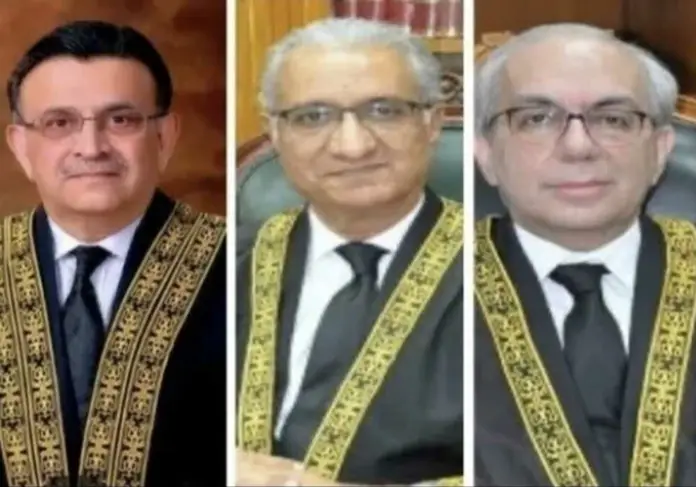According to international diplomatic circles, Pakistan is currently facing a serious crisis due to the demand by former Prime Minister Imran Khan for early elections. A report published in the American magazine Bloomberg has revealed that this desire for early elections has pushed Pakistan into a constitutional crisis. The Judiciary and the Federal Government are in disagreement over the election date, with the government refusing to accept interference in the electoral process. These measures have caused the Prime Minister’s party- PML-N- to lose popularity, even as Imran Khan tries to rebuild relations with the United States. Bloomberg reports that Khan is pressuring the Election Commission of Pakistan to comply with the court order and may even take the federal government to court. The report also mentions that the Chief Justice has ordered the release of funds for the elections from the central bank, but the federal government has refused to provide funds for elections in one province. Furthermore, the government has enacted legislation to limit the powers of the Chief Justice in taking automatic notice, but the Chief Justice has formed an 8-member bench and issued an order to halt this legislation before it was completed. However, despite the Supreme Court’s decision, the Supreme Court Practice and Procedure Bill has become law, with the Parliament passing the Act that subordinates the powers of the Supreme Court to the collective vision under the Law of the Land.
In June 1997, during a period of tension between former Chief Justice Syed Sajjad Ali Shah and the Parliament, the Chief Justice received support from President Farooq Leghari and establishment circles. However, when powerful circles became indifferent to these matters in the broader national interest, both the chief justice and the president resigned from their respective positions. Similar circumstances are being faced today. Recently, an alleged telephone conversation between the mother-in-law of Chief Justice of Pakistan Umar Atta Bandial and Khawaja Tariq Rahim’s wife has been recorded and leaked on social media. It is rumored that the family of the Chief Justice is affiliated with the Pakistan Tehreek-e-Insaaf. It should be noted that the present Chief Justice comes from a distinguished family background. His father, respectful Fateh Mohammad Bandial, served as the chief secretary of Punjab. During my student days, when he was the commissioner of Lahore, I used to meet him regarding student issues, and he would promptly issue orders to resolve the problems. In my opinion, in the current political climate, unjustified allegations have been attributed to Chief Justice Bandial and Khawaja Tariq Rahim’s wife after the leaked alleged phone conversation, which are proving to be advantageous for the ruling party.
The country is currently facing a severe economic and political crisis of unprecedented proportions. The ongoing political instability has also created divisions within institutions. When division and discord become deeply rooted in a country, society, or institution, there is a fear of anarchy and the possibility of tragedies like the one on July 5, 1977. The constitutional crisis in the country is impacting even the robust Supreme Court system.
The government has expressed reservations about the three-member bench of the Supreme Court regarding the elections, and this position has been clearly stated in the Parliament. In the midst of political tension and the constitutional crisis, former chief justice Saqib Nisar’s leaked telephone conversation should prompt him to clarify his position by reaching out to journalists, including General Qamar Javed Bajwa. Similarly, prominent lawyer and former governor of Punjab, Khawaja Tariq Rahim, who has an extensive network of friends, should also state his position regarding the leaked telephone conversations involving his wife. It is also important for political parties to review their systems and choose to ignore social media individuals who only perpetuate rumors to boost ratings on their YouTube channels, as this could ultimately harm political parties.
In May last year, the Supreme Court delivered its verdict on the presidential reference filed to interpret Article 63A of the Constitution, stating that the vote of the dissenting member would not be counted. The Supreme Court bench voted three-to-two on this reference. Chief Justice Umar Atta Bandial, Justice Ijaz-ul-Ahsan, and Justice Muneeb Akhtar favored the decision, while Justice Jamal Mandukhel and Justice Mazhar Alam disagreed. Legal circles argue that the spirit of the Constitution was not adequately considered in interpreting Article 63A in this decision. Despite the passage of over six months since the appeal was filed against this decision, the Parliament has not passed any legislation on the matter.
Regarding the assumption of contempt of court against the Prime Minister for not providing Rs21 billion for elections in Punjab, as ordered by the Supreme Court, it is unlikely to happen because the federal cabinet has already allocated the funds. However, the provision of these funds required the approval of Parliament, and the bill for payment of funds was rejected by Parliament. Consequently, after the resolution of Parliament, a case of contempt of court against the Prime Minister is no longer possible. Moreover, deadline for printing the ballot papers for 297 constituencies has already passed, and the security agencies are unable to provide the necessary personnel to the Election Commission for the elections.
Taking into account the current judicial, political, constitutional, and legal conflicts, the decision of the Election Commission of Pakistan on March 22 to hold elections in Punjab and Khyber Pakhtunkhwa on October 8 seems to be the correct course of action. If the National Assembly and the two provincial assemblies (Sindh and Balochistan) are dissolved on August 12 after completing their terms, elections will need to be held within 60 days, potentially allowing for simultaneous elections throughout the country by October 15. Additionally, the President will have completed their constitutional term of office on September 9, and the Chief Justice of Pakistan on September 15.







